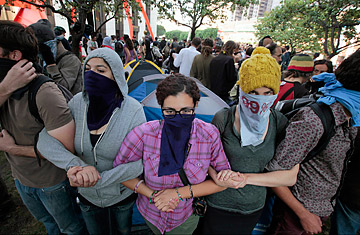
Occupy protesters stand around tents they pitched outside the Bank of America building in Los Angeles on Nov. 17, 2011
After police raids swept the U.S. from Zuccotti Park in New York City to city hall in Oakland, Calif., Occupy protesters are being forced to evolve to keep their movement alive. The Oakland protesters, for example, have migrated to neighboring encampments, while others contemplate turning indoors as winter draws near. However, many protesters don't want to lose their biggest emblem: the urban encampment. So Occupy Los Angeles has become a success story of sorts. Unlike most cities, Los Angeles' encampment on the lawn outside city hall is still standing. Occupiers there have even received handshakes and an official resolution of support from the city council. Even as other urban centers crack down on their local Occupations, Los Angeles says proudly that there have been no "serious incidents" between authorities and protesters.
Still, Los Angeles' Occupiers are growing concerned that their movement won't last forever — at least not in its current form. The mayor's office said this week that the city was in dialogue with the movement and that the campers would not be able to remain on city property indefinitely. "In the last few days, there have been some shifts," says Lisa Clapier, a member of the movement's media team. "We have heard rumors about them wanting to move us." That means considering new ways of getting their message out. "The civil rights movement took 10 years," says protester Chase Golding, 26, who had a face mask on his forehead. "So for us, 47 days isn't going to cut it." What's becoming clear is that Occupiers believe they have to become more creative and more provocative.
The shift in strategizing began to elicit more negative official reaction on Thursday when the movement staged multiple marches that resulted in more than 70 arrests downtown. First, police had their way with protesters who sat in the middle of an intersection. Then came more arrests after Occupiers took over a plaza outside the Bank of America building. Protesters saw the cops in riot gear as more of a threat than in previous days (earlier, some Occupiers praised the police for allowing them to press their civil disobedience). In the latest face-offs between cops and demonstrators, the slightest flinch by one of the several hundred officers in blue surrounding the protest prompted Occupier calls to huddle together to devise a plan for protection against possible tear gas. "We're going on the offensive for sure," says Anthony, an 18-year-old protester who declined to give his last name, after delivering a speech to the crowd through a megaphone. Protesters were ready for jail as well. "I don't want to live in a country where my rights are blatantly ignored because corporations have purchased the politicians," says Golding. "So yeah, I'll go to jail for that." The protesters irked bank employees like Dan Kirkpatrick, a financial adviser at Merrill Lynch, who was standing outside the Bank of America tower mocking the rally. "You have to admit this is a little entertaining," said Kirkpatrick sarcastically. "I want to pass out job applications."
As they press bolder actions, the Occupiers are drawing more than before on the support of union organizers, who say they have a similar message and are eager to help the movement. The Service Employees International Union helped organize the two marches in Los Angeles on Thursday. There were many union T-shirts on display. That came after a nurses' union donated medical care for protesters and members of an electrical-workers' union spent several nights camped outside city hall. "Bank of America is a far better target to raise the issue of income inequality than city hall," Maria Elena Durazo, executive secretary of the Los Angeles County Federation of Labor, said in support of Thursday's march. "We've got to take it to the door of the people who have caused the pain and suffering." Unions plan to continue to help the movement stage more protests in areas away from city hall, Durazo said.
On Sunday, protesters plan to rally outside the American Music Awards at Los Angeles' Nokia Theatre with the support of Black Eyed Peas rapper will.i.am and even plan to put on an Occupy after-party, according to Clapier. Will.i.am couldn't be reached to confirm his involvement.
The movement is also looking to social media to expand its voice and fill the void if the encampments are forcibly evacuated. Next week, the Los Angeles–based company CitizenGlobal plans to launch a website called Studio Occupy that will provide a platform for sympathizers to "take back the airwaves" by uploading their own videos and photos. The content will be available through iPhone and Android apps.
Even if the Los Angeles protesters do have to move out of city hall, they've got supporters in some unlikely places. Local pastor James Boline and Rabbi Yonah Bookstein attended the Bank of America march. "I support justice," Boline said. "I don't support their eviction, and I hope there will be a place for them elsewhere if not the place where they have been." Even one of the police officers who was cordoning off the area voiced his tacit support. "This is history, isn't it?" the officer said quietly. "Just like the Boston Tea Party, you'll read about Occupy in the history books."
